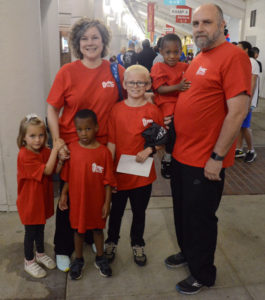
By Steve Brawner, © 2019 by Steve Brawner Communications, Inc.
The number of Arkansas foster children waiting to be adopted has fallen to 343 as of Saturday, and Donald and Jennifer White are the reason it’s not 347.
The Little Rock couple finalized their second two-sibling adoption April 26 by welcoming brothers Keelan, 4, and Aiden, 3, into their family.
Like their new older siblings, Michael, 10, and Lilly, 6, the two brothers first came into the home as foster children. When parental rights were terminated, the Whites adopted them.
“They felt like they were a part of us,” Jennifer said. “We felt like they were a part of us, so it just made sense.”
The Whites became foster parents about a decade ago after a friend underwent the preparation process and alerted them to the need. At the time they had two sons, 12 and 10, and hadn’t really thought about fostering. But their interest was sparked by that friend and by Bible passages like Matthew 25, where Jesus speaks of “the least of these.”
“I know what our Creator wants us to do,” Donald said, “and that’s what I’m designed to try to do with His ability.”
The Whites became foster parents through The CALL, which has recruited more than 2,000 foster and adoptive families since its founding in 2007 and currently has almost 700 homes in service. According to the state’s Division of of Children and Family Services, The CALL recruited 42 percent of the state’s 1,598 foster homes.
The Whites were at Little Rock’s War Memorial Stadium Saturday for the annual Walk for the Waiting. The event raises funds for The CALL and also Project Zero, which focuses on adoptions, and Immerse Arkansas, which serves young people aging out of foster care.
As of Thursday, this year’s Walk had raised a little more than $200,000. The grand marshal was also its leading fundraiser, Louie Schneider, a former foster kid who was adopted and now faces a terminal illness.
Project Zero facilitates adoptions through special events bringing interested families and children together, by producing short biographical films, and through an online and traveling Heart Gallery of photos of waiting children.
The executive director, Christie Erwin, is encouraged by the movement’s recent success. She said 600-700 children were waiting to be adopted when Project Zero was founded in 2011, and the number hovered around 500 for years. Now, partly through Project Zero’s efforts, it’s down to 343. Her group connected 167 children to families last year, the most ever. In 2012, it connected 18.
That’s the good news. Here’s the news that’s not yet good. There are still those 343 children needing a permanent home. In March, about 4,300 children were in foster homes, the result of abuse, neglect and drugs. The Division of Children and Family Services has about 1,600 foster homes available but has set a goal of 1,800. That means it’s still short of its goal, which is not the same thing as the ideal. Each year, 200 Arkansas teens age out of foster care and go into the adult world.
How do you make those numbers go away? Partly with the help of families like the Whites. Donald and Jennifer have had about a dozen foster children in their home in the past 9-10 years, including one who spent a year there before being adopted out of state. They helped connect him with that family.
They adopted Michael and Lilly at ages 6 and 2, took about a year off, and then re-entered the system with plans to foster only. But then Keelan and Aiden walked into their lives.
At ages 48 and 46, Donald and Jennifer are at the age when they might be thinking about emptying their nest, not refilling it with a 4-year-old and a 3-year-old. Meanwhile, having four adopted children ages 10 and below can intrude on their own personal desires.
But, Donald said, “If that calling is there, you have to just grab it and run with it.” So they’re raising and loving their children, and encouraging others to consider opening their homes to the least of these.
“What I’ve always told everybody that I’ve talked to is, it’s the greatest blessing that you’ll ever have,” Jennifer said. “It’s the hardest thing you’ll ever do.”
Related:
How Julie got her daughter back, and her life